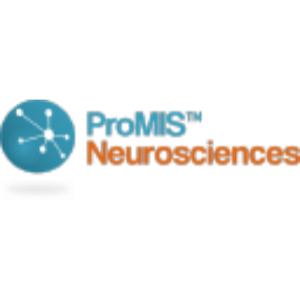ProMIS Neurosciences Initiates Phase 1b Clinical Trial (PRECISE-AD) in Alzheimer’s Disease
Rhea-AI Summary
ProMIS Neurosciences has initiated its Phase 1b clinical trial (PRECISE-AD) evaluating PMN310, a humanized IgG1 antibody, for Alzheimer's disease. The trial will assess safety, tolerability, and pharmacokinetics over 12 months in 100 patients with mild cognitive impairment or early AD.
PMN310 is engineered to selectively target toxic oligomers of amyloid-beta while avoiding plaque deposits, potentially reducing the risk of amyloid-related imaging abnormalities (ARIA), a common side effect in existing therapies. The study will be conducted across 22 U.S. sites, with patients receiving monthly doses at three levels (5, 10, 20 mg/kg) or placebo.
Results from the completed Phase 1a study in healthy volunteers showed favorable safety and tolerability. The company expects to share interim data in the first half of 2026.
Positive
- Phase 1a study demonstrated favorable safety and tolerability profile
- Drug concentrations in cerebrospinal fluid support potential for robust target engagement
- Novel targeting mechanism potentially reducing ARIA side effects
- Large-scale trial with 100 patients across 22 U.S. sites
Negative
- Results and interim data not expected until first half of 2026
- Early-stage trial (Phase 1b) with significant development path ahead
- Requires monthly intravenous administration
News Market Reaction 1 Alert
On the day this news was published, PMN gained 0.98%, reflecting a mild positive market reaction.
Data tracked by StockTitan Argus on the day of publication.
Targeting toxic oligomers without binding to plaque, designed to reduce the risk of ARIA and potentially deliver enhanced outcomes for patients
CAMBRIDGE, Massachusetts, Jan. 10, 2025 (GLOBE NEWSWIRE) -- ProMIS Neurosciences Inc. (Nasdaq: PMN), a clinical-stage biotechnology company focused on developing precision therapies for neurodegenerative diseases, today announced the initiation of its Phase 1b clinical trial (PRECISE-AD) evaluating its lead therapeutic candidate, PMN310, in Alzheimer’s disease (AD).
PMN310, a humanized IgG1 antibody, is engineered to selectively target toxic oligomers of amyloid-beta (AβO)—which are believed to be a key driver of Alzheimer’s pathology—while avoiding interaction with plaque deposits. This mechanism is designed to help reduce the risk of amyloid-related imaging abnormalities (ARIA), a common side effect associated with existing therapies, potentially offering a differentiated product profile.
The ongoing Phase 1b PRECISE-AD trial will assess the safety, tolerability, and pharmacokinetics of PMN310 over 12 months of treatment in 100 patients with mild cognitive impairment (MCI) due to AD (Stage 3 AD) or early AD (Stage 4 AD). The study will also evaluate key biomarkers and clinical measures of efficacy to gather data on PMN310’s therapeutic potential. Results from the recently completed Phase 1a study in healthy volunteers demonstrated a generally favorable safety and tolerability profile, with drug concentrations in cerebrospinal fluid supporting its potential for robust target engagement in patients with AD.
“The initiation of the PRECISE-AD trial is a major milestone in our journey to develop PMN310 as a potential treatment for AD,” said Neil Warma, CEO of ProMIS Neurosciences. “Current AD treatments offer only modest efficacy, often accompanied by significant side effect challenges such as ARIA, leaving a substantial unmet need for new options. We believe PMN310 has the potential to deliver on this need through its selective targeting mechanism.”
“We have partnered with some of the best AD treatment centers in the U.S. for this trial and they are actively screening and enrolling patients. The PRECISE-AD trial has been carefully designed to generate robust clinical data, including biomarker insights and efficacy signals that will guide the next phase of development. We are excited about the opportunity to deliver real innovation to patients and look forward to sharing updates as we progress, with certain interim data anticipated in the first half of 2026.”
“Flourish Research is excited to partner with ProMIS Neurosciences on the research and development of their novel medication PMN310,” said Cameron S. Olezene, M.D., Principal Investigator at Flourish Research in Philadelphia, one of the first sites to become activated in the PRECISE-AD trial. “Monoclonal antibodies targeting toxic amyloid-beta species are the first treatments that have shown disease modifying capacity for Alzheimer's disease. It is often preferable to have multiple therapeutics available as treatment options. Thus, PMN310 is exciting because of its novel targeting of amyloid oligomers, potentially offering another solution for physicians and their patients.”
Mr. Warma added “the trial name, PRECISE-AD, was chosen to reflect our focus on Personalized, Robust, and Effective Clinical Intervention with Specificity and Excellence in addressing Alzheimer’s Disease. This name underscores our commitment to precision therapies, leveraging advanced science to selectively target the root causes of AD and deliver meaningful outcomes for patients. It also reflects the goal of the study design, which is to demonstrate PRECISE targeting of toxic oligomers by PMN310 in Alzheimer’s disease.”
The Phase 1b clinical trial (NCT06750432) is a randomized, double-blind, placebo-controlled study to evaluate the safety, tolerability and pharmacokinetics (PK) of multiple ascending doses (5, 10, 20 mg/kg) of intravenous PMN310 in patients with Stage 3 and Stage 4 AD. The study plans to enroll approximately 100 subjects across 22 active sites in the United States. Eligible patients will be dosed monthly at one of the three dose levels or placebo over 12 months with assessment of safety, tolerability, PK, and pharmacodynamic blood- and brain-based markers of treatment effect at baseline and every three months. Frequent MRI scans throughout the study will be conducted to monitor for emergence of ARIA.
About PMN310
PMN310 is a humanized monoclonal antibody (mAb) designed and developed based on its selectivity for soluble amyloid-beta oligomers (AβOs), which are believed to be the most toxic and pathogenic form of Aβ, relative to Aβ monomers and amyloid plaques. Soluble AβOs have been observed to be potent neurotoxins that bind to neurons, impair synaptic function and induce neurodegeneration. By selectively targeting toxic soluble AβOs, PMN310 aims to directly address the growing body of evidence indicating they may be the primary underlying cause of the neurodegenerative process in Alzheimer’s disease.
PMN310 has successfully completed a Phase 1a clinical study (NCT06105528), a double-blind, placebo-controlled, single ascending dose study of the safety, tolerability and pharmacokinetics of PMN310 infusions in healthy volunteers.
About ProMIS Neurosciences Inc.
ProMIS Neurosciences Inc. is a clinical stage biotechnology company focused on generating and developing antibody therapeutics selectively targeting toxic misfolded proteins in neurodegenerative diseases such as Alzheimer’s disease (AD), amyotrophic lateral sclerosis (ALS) and multiple system atrophy (MSA). The Company’s proprietary target discovery engine applies a thermodynamic, computational discovery platform - ProMIS™ and Collective Coordinates - to predict novel targets known as Disease Specific Epitopes on the molecular surface of misfolded proteins. PMN310, the Company’s lead product candidate for the treatment of AD, is a differentiated, humanized monoclonal antibody that has been designed to specifically bind toxic Aβ oligomers and to not bind plaque or monomers. Oligomers are known to drive disease progression in AD and, to date, PMN310 appears to selectively bind oligomers. ProMIS successfully completed a Phase 1a clinical study with PMN310 in healthy volunteers and has initiated a Phase 1b clinical trial in AD patients. ProMIS has offices in Cambridge, Massachusetts and Toronto, Ontario.
Forward-Looking Statements
Nasdaq has not reviewed and does not accept responsibility for the adequacy or accuracy of this release. Certain information in this news release constitutes forward-looking statements and forward-looking information (collectively, “forward-looking information”) within the meaning of applicable securities laws. In some cases, but not necessarily in all cases, forward-looking information can be identified by the use of forward-looking terminology such as “plans”, “targets”, “expects” or “does not expect”, “is expected”, “excited about”, “an opportunity exists”, “is positioned”, “estimates”, “intends”, “assumes”, “anticipates” or “does not anticipate” or “believes”, or variations of such words and phrases or state that certain actions, events or results “may”, “could”, “would”, “might”, “will” or “will be taken”, “occur” or “be achieved”. In addition, any statements that refer to expectations, projections or other characterizations of future events or circumstances contain forward-looking information. Specifically, this news release contains forward-looking information relating to the Company’s plans and expectations for the Phase 1b study of PMN310 , the potential for PMN310 to positively benefit patients with AD, the targeting of toxic misfolded proteins in neurodegenerative diseases that the Company believes may directly address fundamental AD pathology (including the belief and understanding that toxic oligomers of Aβ are a major driver of AD) and have greater therapeutic potential due to reduction of off-target activity, the potential for PMN310’s mechanism of action to reduce the risk of amyloid-related imaging abnormalities (ARIA), management’s belief that its patented platform technology has created an antibody candidate specific to toxic misfolded oligomers known to be present in AD, therapeutic activity and preferential targeting of toxic soluble aggregates by Aß-directed antibodies and the potential implications thereof, the Company’s pipeline, including application of its platform to other diseases, . Statements containing forward-looking information are not historical facts but instead represent management's current expectations, estimates and projections regarding the future of our business, future plans, strategies, projections, anticipated events and trends, the economy and other future conditions. Forward-looking information is necessarily based on a number of opinions, assumptions and estimates that, while considered reasonable by the Company as of the date of this news release, are subject to known and unknown risks, uncertainties and assumptions and other factors that may cause the actual results, level of activity, performance or achievements to be materially different from those expressed or implied by such forward-looking information, including, but not limited to, the risk that clinical data from healthy volunteers may not be indicative of future results in patients, risks related to progressing the Company’s Phase 1b trial and the Company’s ability to fund its operations and continue as a going concern, its accumulated deficit and the expectation for continued losses and future financial results. Important factors that could cause actual results to differ materially from those indicated in the forward-looking information include, among others, the factors discussed throughout the “Risk Factors” section of the Company's most recently filed Annual Report on Form 10-K for the year ended December 31, 2023 and in its subsequent filings filed with the United States Securities and Exchange Commission. Except as required by applicable securities laws, the Company undertakes no obligation to publicly update any forward-looking information, whether written or oral, that may be made from time to time, whether as a result of new information, future developments or otherwise.
For further information:
Visit us at www.promisneurosciences.com.
Please submit media inquiries to info@promisneurosciences.com.
For Investor Relations, please contact:
Precision AQ (formerly Stern IR)
Anne Marie Fields, Managing Director
annemarie.fields@precisionaq.com
Tel. 212-362-1200








